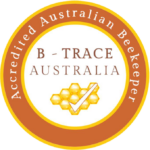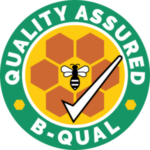
B-Qual news March 2025
12 min readNational survey launched to tackle Varroa mite threat to honey bees
“The Australian Colony Loss Survey will deliver invaluable baseline data that will help us understand and monitor hive health,”
“This data will be crucial for decision-making by governments and industry stakeholders and will be used to inform future research and policy decisions, ultimately benefiting the entire beekeeping community.
“Importantly, the Survey will also provide a fantastic peer to peer learning opportunity as beekeepers will be able to see how other beekeepers are managing varroa.
“We are excited to see the positive impact the Survey will have on our industry and how we can continue to work with others for the benefit of the industry.”
The survey will also have global significance, as it includes pre-Varroa data, offering unique insights into colony losses and beekeeping trends in Australia. This baseline will serve as the foundation for future annual surveys, enabling long-term monitoring of honey bee health.
The project is part of the National Varroa Transition to Management Program and managed by AHBIC and the AgriFutures Honey Bee & Pollination Program. The survey is led by a research consortium at the Australian National University (ANU).
Project Manager, ANU, Dr Michael Holmes, is calling on all beekeepers to participate.
“The survey is about your beekeeping experience from 2023-24 beekeeping season and is for everyone who keeps bees in Australia,”
“Whether you are a large-scale commercial beekeeper or have one hive in your backyard; whether you lost all of your hives or none of them in the past year, the information you provide will be crucial to identify trends in Australian beekeeping.”
“We need as many beekeepers as possible to complete the survey so that we can identify trends in Australian beekeeping and understand the impact of Varroa, other pests and diseases and other issues faced by Australian beekeepers.”
How to participate
The survey is voluntary, anonymous, and takes approximately 7-15 minutes to complete. The survey closes on 10 March 2025.
For further information please contact: Dr Michael Holmes, Project Manager, ANU College of Science
To complete the survey, visit the Australian Honey Bee Colony Loss (COLOSS) survey
The Australian honey bee colony loss (COLOSS) survey is a national survey of beekeepers to monitor honey bee colony losses and management practices.

Gear up for unfair deactivation and unfair termination of Regulated Workers!
New rules were put into force on 26th February 2025, will these affect you and are you prepared?
Unfair Termination
- From 26 February 2025, an eligible regulated road transport contractor (RRTC) can lodge an unfair termination claim if they believe they have been unfairly terminated by a road transport business.
- To be eligible, the RRTC is required to have performed work for the road transport business for at least 6 months from 26 August 2024.
- The FWC will consider whether there was a valid reason for termination and whether the Fair Work (Road Transport Industry Termination Code) Instrument 2024 (Code) has been followed.
- The Code establishes minimum requirements in respect of issuing warnings, following a show cause process and mandatory matters to be considered by the road transport business before terminating.
Unfair Deactivation
- From 26 February 2025, an employee-like worker can lodge an unfair deactivation claim if they believe they have been unfairly deactivated from a digital labour platform.
- To be eligible, the employee-like worker is required to have performed work for the digital labour platform operator for at least 6 months from 26 August 2024.
- The FWC will consider whether there was a valid reason for deactivation and whether the Fair Work (Digital Labour Platform Deactivation Code) Instrument 2024(Code) has been followed.
- The Code establishes minimum requirements in respect of issuing deactivation warnings, following a deactivation process and mandatory matters to be considered by the platform operator before deactivating.
So what does this mean? We are now seeing employee like remedies (such as unfair dismissal) for certain contractors and maybe some basic entitlements like minimum rates of pay too!! Stay tuned – if these new remedies achieve their intended effects, the FWC may even ‘function creep’ to other industries. That is, where independent contractors are vulnerable and often exploited. Think cleaners, farm workers, babysitters. etc.
Casual text sparks resignation dispute.
The Fair Work Commission recently dealt with a case that examined whether an employment relationship ended through resignation or dismissal.
The employee filed an unfair dismissal claim after his brief stint as an operations manager ended. The employer raised a jurisdictional objection (as a reminder: if an employer believes the applicant is not eligible to claim unfair dismissal, they may raise a jurisdictional objection to the claim) arguing that the worker had voluntarily resigned, as opposed to being ‘dismissed’.
Here is some background: resignation or dismissal? After a heated exchange on the phone over a pay dispute, the employee sent a text message to the employer: “Will be making a report to fair work and contacting a lawyer today. There’s a reason staff talk to me, not you. Good luck doing it by yourself. An hour later, the employer announced on the company’s WhatsApp group chat that the employee had tendered his resignation.
The answer? Well, the FWC identified several factors suggesting no legally effective resignation had occurred, including:
- The text message was ambiguous (c’mon, did they really think “good luck” is equivalent to “I quit”?).
- The employee continued to perform work as if nothing happened, until he was directed to stop talking to staff or clients and not to access any work accounts (again, common sense, who continues to work if they’ve resigned?).
- The employer asked the employee to confirm his resignation in writing to which he confirmed he had not resigned and had no intention of doing so (ok, well this one is a no brainer!).
According to the FWC, this case fell within the category of an ostensible resignation where the employer decided to rely on the text message as equating to a resignation rather than clarifying or confirming that the employee genuinely intended to resign. And therefore, the employers reliance on the text message constituted a termination at the initiative of the employer, and a ‘dismissal’ within the meaning of s 386(1)(a) of the Fair Work Act.
Since it was established that the employee was dismissed, the FWC then had to decide whether the dismissal was unfair – and yes it was unfair because there was no valid reason for the ‘dismissal’, and therefore the dismissal was harsh, unjust and unreasonable!
This is a timely reminder that spur of the moment resignations may not be legally effective. Always investigate further and only commence off boarding procedures once the employee has cooled down and confirmed in writing their resignation. And of course, clients should call us whenever a heat of the moment resignation occurs!
Big changes in workplace practices
The Right to Disconnect
Wait, didn’t this already happen!?!!
This right protects employees who refuse to monitor, read or respond to contact or attempted contact outside their working hours, unless of course their refusal is unreasonable. This is currently in force for large business employers (with 15 or more employees). However, on 26 February 2025, the right will now apply to ALL businesses (including small business employers with less than 15 employees).
Casual employment – The Employee Choice Pathway
The new Employee Choice Pathway will apply to large business employers (15 or more employees) from 26 February 2025. This means eligible casuals will now have the responsibility and obligation to initiate the transition to permanent employment, and this request must be made in writing. This new regime replaces the current rules for casual conversion, meaning from 26 February 2025, employers are no longer required to make a written offer to convert a casual to permanent employment within 21 days of the casual’s 12-month anniversary, if they were eligible. This change takes effect for small business employers later on 26 August 2025.
Unfair termination and deactivation
More rights for Contractors!!! Similar to the unfair dismissal claim that employees can make, eligible contractors can make claims for unfair termination and unfair deactivation, effective 26 February 2025.
The Fair Work Commission prescribes a dose of fairness to a Nurse amidst redundancy battle
A national medical centre attempted to avoid paying redundancy entitlements to a Nurse by offering her alternative redeployment in a significantly different role, one that paid a lot more but was NOT a nursing position.
The employer applied to reduce her redundancy payout to nil on the basis she rejected its offer of a suitable alternative position. The Nurse who had worked for the company for a long 8 years refused to take on the “Occupational Health Technician Role” arguing that it was not a nursing role which would put her medical registration at risk, leaving her future aspirations in a ‘critical condition’. Additionally, the hours of work associated with the new role would clash with her childcare responsibilities, and she’d lose an additional week of annual leave which nurses are entitled to under their award. Having taken this into consideration, the Nurse kindly rejected the offer.
Consequently, the Fair Work Commission (FWC) ruled in the Nurse’s favour, agreeing that the redeployment opportunity was indeed not reasonable, flatlining the employer’s attempt to avoid paying 14 weeks of redundancy pay, declaring that the employer’s offer was as useful as putting a band-aid on a broken bone…
Key takeout: There are no redundancy loopholes! If you’re trying to avoid redundancy payment by offering an alternative role, make sure it’s actually suitable. Just because the new job offer has the same location and higher pay does not mean it’s a fair trade – especially if it forces an employee to abandon their profession, lose key entitlements and disrupt their work life balance.
“Inadequate” policy leads to reinstatement of cocaine user
The Fair Work Commission (FWC) have recently reinstated an employee who was terminated for testing positive to cocaine, following a random drug test during his shift which breached the company’s “zero-tolerance drug and alcohol policy”. The 49-year-old had been “self-medicating” with cocaine to cope with the pain of a workplace shoulder injury. Despite this, the FWC took a hard look at the policy and found it to be “inadequate”.
Was the employee “intoxicated” at work?
The simple answer, is no…
While cocaine itself leaves the body in hours, its non-active metabolites linger, triggering positive drug tests long after impairment has faded. This means there would have been no “intoxication” during work hours.
Keep in mind, just because the employer has a ‘zero-tolerance’ approach, this does not mean a breach of the drug and alcohol policy automatically warrants dismissal. Although, there may be a valid reason for termination, an unfair dismissal claim can still be successful if the dismissal was ‘harsh’.
The company’s drug and alcohol policy failed to explain if it tests for inactive metabolites as well as ‘drugs’ and that the detection of these will result in a positive test even after the parent drug has left the employee’s system and the person is not regarded as being intoxicated.
Additionally, observing that the employees record was not entirely unblemished, the FWC determined that the disciplinary sanctions imposed on the employee during his 25 years’ service with the company are limited to only two warnings and that he has never previously breached the drug and alcohol policy, despite being tested on many occasions. Therefore, these findings resulted in the FWC determining that the dismissal was harsh, and the unfair dismissal claim was successful.
The verdict?
The employee gets his job back, the company gets a wake-up call to update the wording in their drug and alcohol policy – or they can simply just call Peninsula, and we’ll make sure their policies are not left to interpretation…
Beekeepers are struggling to keep hives alive
Australian beekeepers are confronting a severe decline in honey production due to prolonged drought conditions. In South Australia, some producers report yields plummeting to less than 10% of typical harvests.
The scarcity of blooming flora has deprived bees of essential nectar and pollen, compelling apiarists to hand-feed their colonies with sugar solutions to ensure survival. This crisis not only threatens the viability of honey businesses but also jeopardizes critical pollination services vital for agriculture.
The financial strain of supplementary feeding, coupled with diminished honey sales, is prompting some beekeepers to contemplate exiting the industry. Consumers may soon feel the impact through increased honey prices and potential shortages. This situation underscores the broader environmental challenges posed by climate variability, affecting both biodiversity and food security.
If you are struggling with this issue, here are some tips that, if you have not tried them already, may be of help.
- Supplemental Feeding – Provide sugar syrup and protein patties to compensate for the lack of natural nectar and pollen, ensuring colonies stay nourished.
- Strategic Hive Placement – Relocate hives near irrigation sources, water bodies, or areas with reliable flowering plants to improve forage availability.
- Plant Drought-Resistant Flora – Cultivate native, drought-tolerant plants that provide nectar and pollen, such as eucalyptus, grevillea, and rosemary, to support long-term hive health.
- Improve Hive Insulation – Use shade structures, ventilation, or water misting systems to regulate hive temperatures and reduce heat stress on bees.
- Reduce Hive Numbers Temporarily – Consolidate weaker colonies to strengthen overall hive health and reduce resource demands, ensuring the strongest colonies survive tough conditions.
Minimising RISK with Fair Work and WorkSafe Claims against your Business
Every business in the country reports to at least 3 regulatory authorities:
- The ATO.
- Fair Work and
- WorkSafe.
The ATO is the easy one. The Accountant puts it in place and we follow the bouncing ball.
Fairwork and WorkSafe are the hard ones. With contains changes, the requirement for Policy, Process and Proof, it represents SUBSTANTIAL RISK for Business Owners.
If you would not dream of having an Accountant when these two regulatory authorities are the hard one, it is important to GET SUPPORT!!
Getting support
Considering the ever-changing HR and OH&S landscapes, it is important for Business Owners and Operators to stay ahead of the curve and understand the impact of legislative changes upon their business. It is also a statutory obligation for all businesses to have a compliant OH&S system.
It is our intention to both proactively and strategically protect the business owners and operators regarding HR and OH&S. It is important for us to assist our members in having the relevant Policy, Process and Proof to facilitate this.
That is why we work with you 24/7/365. It is also our intention that these systems assist with enhancing the return on investment form your labour fixed costs, which I personally feel more than covers the cost for this compliance.
We are here to take work off your table and provide you with the peace of mind and confidence that you are supported and protected as both a business and an individual.
We provide peace-of-mind and confidence.
Peninsula is “NOT” a Government organisation. We are a proudly independent company helping Business Owners proactively and strategically protect their businesses regarding HR and OH&S.
Let us take the load.
Peninsula will work with you to navigate and manage confusing workplace requirements. We are here to support YOU.
How does it work?
By advising, assisting and supplying robust Policy, Process and Proof, (record keeping systems).
We take a huge administrative component from your business. By customising and providing employment documentation including contracts, employee handbooks, employee letters and correspondence, performance management and disciplinary materials and a variety of other bespoke materials.
By providing 24/7 advice and support in relation to FairWork and Work Safe legislation, compliance, managing employment relations matters and holding difficult conversations. In fact, anything to do with Employment Relations and Work Health and Safety.
Providing access to our Award-Winning Legal Partner for legal representation.
Safeguarding our clients against the financial costs of workplace claims. This is subject to the terms and conditions of the attached PDS.
PLUS our BrightSafe and BrightHR Software Solutions, which can help you get on top of Work Health and Safety compliance, rostering, leave management, expense management and document management.
Additional resources for review
Please take a moment to view this short video clip.
Please also click on the following link for Trustpilot reviews. We have an excellent 4.8 stars out of five across over 1800 reviews.
https://au.trustpilot.com/review/employsure.com.au
With over 31,000 clients just like you, Peninsula is a brand you can trust at a price you can afford.
Get in touch for details and to sign up
Office: Phone: 07 4994 9820
B-QUAL email: admin@bqual.com.au
B-TRACE email: admin@btrace.com.au
Join B-TRACE QA and Food Safety Program:
“Accurate record-keeping is the backbone of a successful food safety program.”

Food safety is crucial for maintaining health standards and ensuring that food doesn’t cause harm to consumers. One vital aspect that everyone involved in food production, from farmers, food manufacturers, and beekeepers must focus on is strict record keeping. Joining the B-TRACE QA and Food Safety Program is one way to help achieve this goal and enhance food safety practices by using the B-TRACE hive management app.
The B-TRACE program encourages small and medium enterprise beekeeping operators to put reliable, systematic practices in place to ensure that all aspects of food safety are handled correctly.
What is B-TRACE?
B-TRACE could stand for “Building Traceability Assurance for Compliance and Excellence.” The program is designed to equip beekeepers with the tools and knowledge they need to ensure food safety from apiary to consumer.
The primary aim of B-TRACE is to enable operators to track and monitor every aspect of honey production. This includes gathering, processing, packaging, and distribution. Keeping accurate records allows businesses to pinpoint any problematic areas before they lead to significant issues.
Why Join B-TRACE?
There are several reasons why being a part of the B-TRACE QA and Food Safety Program is beneficial:
1. Enhanced Safety Standards:
By joining B-TRACE, you align your practices with industry standards that emphasize food safety and quality.
2. Improved Traceability:
With the use of the B-TRACE hive management app, you can easily trace products. This is critical in the event of a food recall.
3. Better Consumer Confidence:
When customers know that a company is dedicated to safety, they are more likely to trust its products.
4. Regulatory Compliance:
Participating in B-TRACE helps ensure that your organization meets all industry standards and requirements for food safety and record keeping.
Statistics show that businesses with strong record-keeping are less likely to experience safety violations. Keeping accurate records allows companies to identify trends and improve their safety protocols effectively. As part of B-TRACE, you will have access to templates and software designed to simplify this process.
Benefits of Effective Record Keeping
1. Liability Protection:
In case of illness reports or food recalls, having excellent records can protect your business legally.
2. Operational Efficiency:
When everything is documented, it becomes easier and quicker to find crucial information, thereby allowing for better decision-making.
3. Employee Training:
Records provide a history of incidents and safety measures. They are valuable tools for training employees on food safety practices.
4. Quality Control:
Systematic record keeping can help identify areas for quality improvement.
Make the move now contact BTRACE via www.btrace.com.au or phone 07 4994 9820

Notices
B-TRACE Audits.
If you have not yet submitted your online audit for the current year, please do so to keep your accreditation up to date.
The online audit form is available in the member section of the B-TRACE website or alternatively, contact admin@btrace.com.au and we will email one to you.
Once completed email back to the office.
Allow 5-7 days for audit review and issue of the accreditation certificate.
B-QUAL and/or B-TRACE logos.
Pre-printed logo labels are available from the office.
B-TRACE 30mm lid labels full colour
$26.50/1000 (plus GST and postage)

B-QUAL 12mm jar labels full colour
$ 22.50/1000 (plus GST and postage)
If you are printing your own labels high Res’ artwork is available free of charge.

B-QUAL Self Assessments.
If you have purchased your Approved Supplier Manual but have not yet submitted the self-assessments, you cannot proceed with further certification until self-assessments are submitted.
The assessments are in the first section of the manual. Complete both assessments and send them to admin@bqual.com.au for review and certificate issue.
If you have any queries about assessments contact admin@bqual.com.au for further assistance.
Members section of websites.
To access the member section of the B-QUAL and B-TRACE websites you need to create an account.
To do this email the office requesting an account for either website.
Once the account is set you will receive an email requesting to log in and change the initial password. Remember that you must have a separate account for the members section, your app or other passwords will not work.
Our Sponsors:
We acknowledge and thank Steritech and the CMV Group for their valuable ongoing support of B-QUAL and B-TRACE which assists us to continue to participate in research and industry development works that we see as important to our industry.

Please support those who support us.
Contact details
General enquiries for B-QUAL & B-TRACE:
Office: All enquiries. Phone: 07 4994 9820
B-QUAL email: admin@bqual.com.au
B-TRACE email: admin@btrace.com.au
Newsletter disclaimer:
Material and information published in the B-QUAL newsletter are produced for general information only. Although published in good faith, the company and/or any officer of the company will not be liable for any loss suffered by any person for action taken on the basis of such information.
